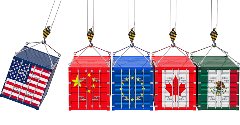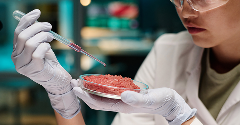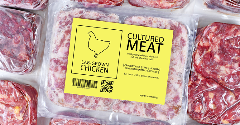News
Red yeast rice: Japan recalls supplements after investigation into deaths
25 Apr 2024Red yeast rice supplements from Kobayashi Pharmaceutical were recalled over their potential link to kidney disease following five deaths and approximately 240 hospitalisations.
Osaka-based Kobayashi Pharmaceutical’s cholesterol-lowering supplements have been recalled over their possible connection to kidney disease after recent deaths and hospitalisations raise significant health concerns.

Five people have died and 240 have been hospitalised after consuming Kobayashi Pharmaceutical products containing red yeast rice, an ingredient called beni koji. Three supplement brands have recently been recalled due to safety concerns. The products, known as “Beni Koji Choleste Help”, contain red yeast rice, which is made by fermenting rice.
Japan’s Ministry of Health told retailers to remove all Benikoji CholesteHelp, NaishiHelp Plus Cholesterol and Natto-kinase Sarasara Tsubu GOLD stock as it investigates Kobayashi Pharmaceutical’s products.
A spokesperson for the company reported that a preliminary investigation had detected substances it “did not intend for” in some of the materials used in the manufacturing process.
Puberulic acid, a natural compound with antibacterial and antimalarial properties made from blue mould, was unexpectedly discovered in the products. Ongoing examinations continue to ascertain if and what role it played in the five deaths and hospitalisations of 240 people.
At least two additional substances were also found in samples manufactured during the time period concerned, between June and August 2023, news agency The Japan Times reported on 20th April 2024.
Trust and confidence in functional food falls
The public’s perception of supplement safety is currently in question following the deaths and hospitalisations. They prompt distrust and a broader health scare relating to the more expansive dietary supplements and functional food markets.
Demand for supplements loses appeal, with sales of functional foods in Japan falling by 11% on the year in the week of 1st April, Nikkei Asia reported. Since Kobayashi announced a recall of its red yeast rice items, the reduction in functional food sales has sat at approximately 10%.
The Japanese Consumer Affairs Agency has recently surveyed around 1,700 functional food manufacturers. The manufacturers were asked if they had received any reports of health issues related to their products and if they had established systems to collect such data.
With a deadline of the 19 April, the survey aims to help the agency take follow-up measures to address growing consumer concerns about functional food safety. Nikkei Asia confirmed that Kobayashi's products are just some products under scrutiny.
Recalling red yeast rice supplements
On 22nd March 2024, the company issued a press release communicating its voluntary recall of the three supplement brand products after customer complaints about kidney problems.
Kobayashi conducted an ingredient analysis of "Beni-koji Choleste-Help", a functional claim for food marketing. After investigating the products and the red yeast rice ingredients used, it conveyed that some of the ingredients may contain components it did not anticipate. “For customers who have any of the subject products listed, we ask that you please discontinue the use of the product and refrain from consuming it in the future,” said Kobayashi.
On 25 March 2024, Kobayashi issued a second response, furthering its request to discontinue using red yeast rice-related products and indicating its voluntary recall notice. Opening Health Consultation Centers, the Osaka-headquartered company apologised for the long hold times for calls from customers who felt physical discomfort.
After completing its inspection of products manufactured in the last year and summarising those results in the report, the company said it could not identify the exact ingredient nor the causal relationship between the product and experiencing kidney problems. As a result, the company is still recalling all products, regardless of manufacturing number.
The company recorded some 12,000 cases of users complaining about health problems, it said during a press conference, CNN reported. Kobayashi said it supplied red yeast rice to approximately 50 other companies in Japan and two in Taiwan. The ingredient can also be used in various products, including confectionery, bread, miso, seasoning and sake. Sales of the recalled products online have been stopped in China, and they have been taken off the market in Taiwan, reports said.
Lacking a robust regulatory landscape
Japan has seen a surge in health and wellness trends in food products in recent years, with functional products attracting consumer attention. According to Statista, the production value of health foods in Japan was estimated at two trillion yen (€12.3 billion) in 2022.
Restoring trust in the supplements market is challenging, particularly as Japan is perceived to lack stringent regulatory measures that secure supplement safety. In Japan, the health food market includes foods claimed to promote health. Previously, the market primarily consisted of "foods for specified health uses" (FOSHU) and "foods with nutrient function claims" (FNFC).
In 2015, a new category of foods with functional claims was introduced as a cost-effective alternative to the government-screened tokuho classification, which includes foods with special health qualities. Introduced to help smaller companies offer value-added foods, companies are only required to provide evidence of efficacy under this classification.
Unlike pharmaceutical products, foods labelled functional in Japan do not fall under the guidance of the Good Manufacturing Practice regulation. Falling outside this remit suggests there is no regulatory oversight for manufacturing elements such as the process, ingredients or their concentrations or product format.
In countries other than Japan, products that bear functional claims are subject to more stringent regulations. The US, for example, defines dietary supplements as products intended to complement the diet, which can be presented in various formats, such as powders and capsules. A distinct regulatory system exists for dietary supplements, and manufacturers need to meet production and quality control standards.
The European Union (EU) and the Association of Southeast Asian Nations (ASEAN) also have stricter rules on functional foods.
Related news

Tariff volatility leaves food manufacturers in limbo
11 Mar 2025
Rapid US trade policy shifts and tariff escalations are creating uncertainty for food manufacturers and ingredient suppliers.
Read more
F&B industry hit with fresh greenwashing claims
26 Feb 2025
The food and beverage (F&B) industry is under fresh scrutiny amid claims of greenwashing, with Arla the latest company in the firing line.
Read more
Protein diversification: A massive missed market?
20 Feb 2025
Germany and the UK could be missing out on the massive market for alternative meats and proteins, with one new coalition calling for an end to the “steak-tofu struggle”.
Read more
Have scientists discovered a new tool to measure UPFs?
19 Feb 2025
Researchers have developed a new scoring system and database, compiling over 50,000 food items, of which over 1,000 are classified as ultra-processed.
Read more
China ramps up cultivated meat research with new innovation base
18 Feb 2025
China has opened its first fermentation and cultivated meat research centre in Beijing.
Read more
Most consumers lack trust in AI, but supplement users are ready to embrace the technology
14 Feb 2025
A survey of UK and US consumers found that most supplement users are willing to let AI make decisions on their behalf, but they also demand greater transparency.
Read more
Indians enjoy first bites of cultivated chicken
13 Feb 2025
The first public tasting of cultivated meat in India has taken place as the country prepares for the first commercial cultivated meat products – potentially as early as the end of this year.
Read more
Disruptor brands spearhead sustainable solutions
11 Feb 2025
Manufacturers, big and small, sharpen their focus by providing sustainable products and services centred on comprehensive and sustainable approaches to traditional methods.
Read more
Leading regulatory updates in Asia in 2025
7 Feb 2025
As we head into 2025, numerous legislators around Asia are suggesting and solidifying legal updates and changes that will impact the food and beverage space.
Read more
RSPO prepares for next stage of sustainable palm oil production
6 Feb 2025
The Roundtable on Sustainable Palm Oil (RSPO), a global standards and governance body, is advocating for stronger regulations and frameworks, and taking action to plug supply chain and traceability interruptions.
Read more